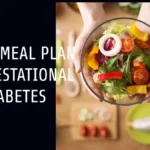
It might be difficult enough to choose the vitamins you need to take in addition to your diet. The stakes are significantly raised when you add a new factor – a human being that is developing inside you! Here’s everything you need to know about why you need prenatal vitamins and what are best 10 prenatal vitamins for a healthy pregnancy?
We have selected best 10 prenatal vitamins for a healthy pregnancy from the number of options available in the market. Pregnancy Boss makes selection decisions based on contributors and users as well as unbiased analysis and professional judgment?
Best 10 Prenatal Vitamins for a Healthy Pregnancy
• Best Prenatal Vitamin Overall : One A Day Prenatal 1 Complete Multivitamin
• Best Value Prenatal Vitamin : Nature Made Prenatal Multi + DHA
• Best Prenatal Gummy Vitamin : Vitafusion Prenatal Gummy Vitamins
• Best Vegetarian Prenatal Vitamin : Garden of Life Vitamin Code Raw Whole Food Prenatal
• Best Preconception Prenatal Vitamin : Theralogix TheraNatal Core
• Best Prenatal With Iron : Pink Stork Total Prenatal Vitamin With DHA & Folate
• Best Prenatal Vitamin with Organic Ingredients : New Chapter Advanced Perfect Prenatal Multivitamins
• Best Prenatal DHA : Nordic Naturals Prenatal DHA
• Best Vegan Prenatal : Naturelo Prenatal Multivitamins
• Best Liquid Prenatal : Pink Stork Liquid Prenatal
Taking a prenatal vitamin every day is one of the easiest and most crucial things you can do to guarantee you have a healthy baby while you are pregnant. Prenatal vitamins can help your baby acquire a balance of essential nutrients to promote her development, but they cannot substitute a healthy diet, sufficient medical care, or stress management.
Here are the advantages of prenatal vitamins for you as well as tips on how to pick the best prenatal vitamin.
What are Prenatal Vitamins?
Prenatal vitamins are specialized supplements made just for pregnancy, and the majority of them include a same ratio of important nutrients to support both the mother’s and the baby’s health. They all aid with either the development of the baby, or they help mom maintain her levels of specific vitamins and minerals.
Do I Need to Take Prenatal Vitamins When Pregnant?
Prenatal vitamins are required when pregnant. Prenatal vitamins are specifically developed to give the particular types and amounts of nutrients required at various stages of your baby’s growth, so a standard multivitamin will not be sufficient. They also make certain that you have adequate nutrients so that your body does not become exhausted.
Folic acid, for example, is critical in the early stages of a baby’s brain and spine development. During pregnancy, your body requires twice as much iron as it did before you were pregnant. In addition, many prenatals contain vitamin D and calcium, which help to create strong bones and teeth throughout the third trimester.
Do Prenatals Make Me More Fertile?
There is no proof that prenatal supplements boost your chances of conceiving or make you more fertile. If you are having difficulty conceiving, you should seek professional help from a fertility expert. (In general, the Mayo Clinic recommends seeking medical help after a year of trying to conceive if you’re under 35; that number reduces to six months if you’re 35 or older. However, other variables may have a role, such as if you have reproductive health conditions like as irregular periods.)
When Should I Start Taking Prenatal Vitamins?
Prenatal vitamins should preferably be started three months before to trying to conceive. This is due to the fact that women who take folic acid supplements before becoming pregnant can lower their risk of developing neural tube defects. Folic acid is a crucial component of effective prenatal vitamins (which affect the brain and spine).
Give yourself some grace if you didn’t start taking prenatal vitamins early, though, as many pregnancies in the U.S. are unplanned or mistimed, making preventive vitamin-taking tough! It is advised to don’t beat yourself up, just take them as soon as you can. Be sure to also inquire with your doctor about taking a prenatal supplement even after giving birth and stopping breastfeeding (if you opt to do so).
Related: What To Eat When Pregnant?
How Long Should I Take Prenatal Vitamins?
You should take your prenatal vitamin on a regular basis throughout your pregnancy. If you want to breastfeed, you should continue to take a prenatal vitamin for at least six months, if not the whole pregnancy.
If you’re already pregnant and haven’t been taking prenatal vitamins, don’t panic; simply begin as soon as possible.
What is the Best Time of Day to Take Prenatal Vitamins?
It is unimportant what time of day you take your prenatal vitamin. Many pregnant women find that taking their prenatal vitamin with a meal helps alleviate nausea. Some individuals even take it in the evening with a snack before bed.
What Vitamins Need to be in Them?
It’s crucial to keep in mind that every person, whether or not they are pregnant, has slightly different dietary requirements based on their genetics and any existing medical conditions. Always talk to your healthcare provider about your unique prenatal needs, and if you’re a vegetarian or vegan while pregnant, let them know so they can make sure you’re getting the proper nutrients.
However, it should be noted that the following vitamins and minerals, together with the recommended daily allowance (RDA), are thought to be essential during pregnancy. Many of these elements can be found in your diet, but prenatal supplements are designed to make up any deficiencies. Although you shouldn’t anticipate your prenatal to have the full RDAs of all the ingredients listed, it should nonetheless contain adequate amounts of the following:
• Folic acid (often known as folate or vitamin B9) 600 mcg: Folic acid, as was previously discussed, can help shield your unborn child from early neural tube problems.
• Vitamin A 750–770 micrograms: The eyes, ears, limbs, and heart of the fetus are formed in part by vitamin A. The safer beta-carotene, which your body converts to vitamin A, is used by many manufacturers since amounts exceeding 10,000 IU (also known as international units) can be harmful.
• Vitamin E (15 mg) and vitamin C (80–85 mg): These two are crucial for the production of fetal collagen and the supporting of the mother’s immune system. Avoid taking excess vitamin C without first consulting your doctor since it might be harmful to your unborn child.
• Vitamin D 15 mcg (600 IU): A growing body of research indicates that vitamin D supports immunity and enhances the mood of the mother, in addition to supporting fetal and maternal bone health. If your doctor thinks you might not be getting enough, she could suggest an additional supplement.
• Calcium 1,300 to 1,400 mcg: For the development of your unborn child’s bones and teeth, all women between the ages of 19 and 50, including those who are pregnant, require 1,000 mg of this essential mineral daily. In patients with low calcium levels, calcium supplementation may help lessen the risk of preeclampsia.
• Iodine 220 mcg: Your unborn child’s thyroid and brain development are aided by iodine. Since salt is iodine-fortified, many people can obtain enough through food.
• Iron 27 mg: T his element is essential for boosting a baby’s blood supply (and yours). To sustain appropriate blood cell synthesis during pregnancy, supplementation is required since iron needs rise. Your doctor could prescribe extra if, like many pregnant women, you start to feel underweight.
• Zinc 11 to 12 mg: Your immune system and healthy cell division are supported by this mineral.
When choosing a prenatal vitamin, you might also wish to take into account the following extras:
• DHA: DHA, an omega-3 fatty acid present in several species of fish, may not be present in regular prenatal vitamins. Both before and after delivery, DHA may help with a baby’s brain development. Ask your doctor if you should take a supplement, if you’re unable to consume the recommended two to three servings (8 to 12 ounces) of pregnancy-safe fatty fish per week.
• Additional nutrients: The label may also list additional ingredients like copper, choline, thiamin, vitamin B12, magnesium, ginger, or vitamin B6 (both may help with morning sickness).
Are There any Side Effects to Prenatal Vitamins?
Prenatal vitamins are generally regarded as safe when used as recommended. However, some vitamins or nutrients can have minor negative effects, mostly affecting the digestive system. Here is a summary:
• Constipation: When you combine an iron supplement with the pregnancy hormone progesterone, constipation might become difficult to manage. Make sure you’re getting enough fiber in your diet and drink lots of water. To keep things going, you might also inquire with your doctor about a stool softener.
• Nausea and vomiting: People may get nausea from iron as well. Prenatal vitamins are supposed to be taken with “easily digestible” foods like crackers or applesauce. You could also need to switch brands, take your vitamin at bedtime, or try out other formulas.
• Bright yellow urine: Large dosages of B vitamins, such as riboflavin, may cause your urine to have a brighter color. This is usually not harmful, but you should always consult your doctor if you have any concerns.
Related: Side Effects of Prenatal Vitamins: What They Are and How to Treat Them
What are the Different Kinds of Prenatal Vitamins?
It feels like there are around 10 billion different types of prenatal vitamins when you walk into a pharmacy or look up prenatal vitamins on Amazon. However, they can be roughly classified into the following groups:
• Capsules or tablets: A pill that you swallow whole is the ideal option if a lady wants to acquire all the vitamins and minerals she needs in one prenatal vitamin.
• Liquids, powders and chewables: A chewable or liquid vitamin might be a better choice for women who are nauseous, but these supplements might be deficient in some of the aforementioned vital components. Read the labels carefully to determine whether you need to take any additional supplements.
• Prescription: Some pregnant women who have adverse effects may need a prescription. Both over-the-counter and prescription vitamins will have all the essential nutrients, but their formulations may differ. For example, a prescription vitamin may contain iron, which reduces constipation, or it may contain a stool softener to ease constipation or vitamin B6 to ease nausea. But there’s no need to rush to the doctor if you can take the OTC versions. In general, sticking with an over-the-counter vitamin is simpler, more practical, and perhaps even less expensive.
How to Buy the Best Prenatal Vitamin for a Healthy Pregnancy?
Here are some considerations to make as you begin your vitamin research to make sure you choose the right one for you.
• How long will this bottle last? Given the cost of vitamins, it seems sense to compare the recommended daily dosage to the number of pills contained in a bottle. (If you take three tablets a day, a big bottle disappears rapidly.)
• What format is best for me? Dislike taking pills? Since they tend to be smaller, look for capsules with a slick covering and those that don’t include calcium. Alternately, choose liquids or chewables, but be aware that you might be missing out on some nutrients.
• What is my diet like? It can be harder to obtain iron and calcium from food alone if you’re a vegetarian or vegan, for instance, so it’s a good idea to prioritize those supplements or take extra.
Consistency is perhaps the most crucial element. The best prenatal is the one you can take daily and tolerate. Ask your healthcare practitioner about additional possibilities if these suggested best 10 prenatal vitamins for a healthy pregnancy don’t seem to be of any assistance.
Do I Need a Prescription For Prenatal Vitamins?
Prenatal vitamins are widely accessible over the counter, and a prescription is rarely required. The difference between over-the-counter and prescription prenatals is minimal, and both are adequate.
Prescription prenatals may have unique formulations, such as a stool softener added to aid with constipation, or they may include more iron. The tablets might potentially be smaller and simpler to swallow.
Whether you want to take a prescription prenatal, check with your insurance first to see if they’re covered; if they are, you’ll most likely need a prescription from your doctor.
Our List of Best 10 Prenatal Vitamins
One A Day Prenatal 1 Complete Multivitamin
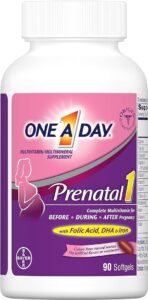
This one-a-day prenatal vitamin delivers everything you need while you’re trying to conceive, pregnant or breastfeeding, with 100 percent of the daily value for important nutrients, including folic acid.
Pros
- It’s just one softgel per day—ideal for those who struggle with swallowing pills
- Gluten- and dairy-free without the use of artificial sweeteners and flavors
Cons
- It’s not organic or vegan
Nature Made Prenatal Multi + DHA

This Nature Made prenatal vitamin covers the essentials you’ll need before and during pregnancy, complete with folic acid, DHA, calcium, iron, magnesium, vitamin E, vitamin B12 and vitamin D3. Plus, softgels make it easy to swallow and help boost absorption.
Pros
- Includes DHA and all extra vitamins to support cellular energy production
- It has 800 micrograms of folic acid
- You only need one softgel per day
Cons
- Not vegan or organic
- Some users report a fishy odor
Vitafusion Prenatal Gummy Vitamins
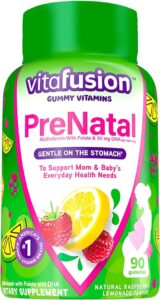
Pop two gummies a day for DHA, vitamins A and D, folic acid and as much Vitamin C as you’d get from 10 tangerines. Natural fruit flavors mean they’re tasty too (and more than 18,000 positive reviews back that statement up). If you’re gagging over your prenatal pill, gummies can be be a good alternative—just note that gummy vitamins tend not to have iron or calcium.
Pros
- They taste like candy
- Good for those who have difficulty swallowing pills
- Affordably priced
- These vitamins contain no high-fructose corn syrup, artificial sweeteners gluten or dairy
Cons
- Not vegetarian or sugar-free
- They don’t contain iron or calcium
Garden of Life Vitamin Code Raw Whole Food Prenatal
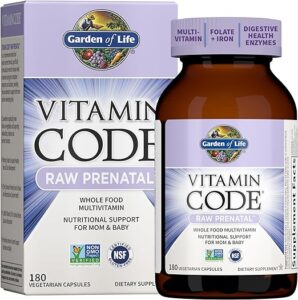
Garden of Life Vitamin Code Raw Whole Food Prenatal is a nutrient-rich formula designed to support women during pre-conception, pregnancy and lactation. 23 organically grown fruits and vegetables provide antioxidants, vitamins and nutrient cofactors.
Pros
- USDA certified organic
- Non-GMO project verified
Cons
- Pricey
- Can be difficult to swallow
Theralogix TheraNatal Core
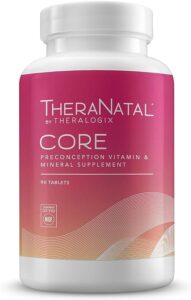
TheraNatal is a fertility-focused prenatal vitamin that’s designed to prepare your body for pregnancy. With healthy doses of folate, vitamin D, choline, and other important fertility vitamins, TheraNatal Core is a daily multivitamin that can take you from pre-conception to your first trimester.
TheraNatal is an easy-to-take vitamin that requires only one tablet per day to give you all the nutrients your body needs while you’re trying to conceive. Theralogix products (like Ovasitol) are all doctor-formulated and are free of any dye, gluten, and dairy. Plus, they’re formulated with the highest quality ingredients available.
Pros
- Vegetarian
- NSF-certified
Cons
- Doesn’t contain DHA
Pink Stork Total Prenatal Vitamin With DHA & Folate
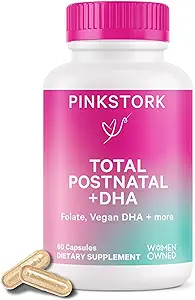
This formulation has the prenatal support moms need—the right amounts of folate, iron, vitamin D, and vitamin B6 required for optimal development plus 200 mg DHA—without additives they don’t want: Pink Stork is sugar-free, vegetarian, and doesn’t contain milk, eggs, soy, wheat, shellfish, fish, peanuts, or tree nut allergens.
Pros
- Third-party tested
- Made without gluten, wheat, dairy, soy, GMOs, and more
Cons
- Doesn’t contain folic acid, choline, vitamin B12 (cobalamin), selenium, and EPA
- Some complaints about side effects, such as acne and headache
New Chapter Advanced Perfect Prenatal Multivitamins
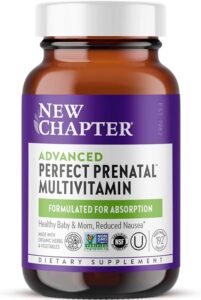
This prenatal and postnatal multivitamin by New Chapter is one of the best organic prenatal vitamins on the market today. The thought of taking a prenatal vitamin when you’re struggling with morning sickness can make your stomach turn even more. This prenatal from New Chapter may be gentler on you, thanks to the addition of ginger. It contains over 23+ vitamins and minerals plus a clinical dose of ginger for nausea relief. This supplement is gentle on your stomach and easy to digest.
Pros
- NSF-certified
- Contains ginger, which may be helpful for nausea
Cons
- Does not contain choline
- Lacks omega-3 DHA and EPA
- Requires 3 pills per day
Nordic Naturals Prenatal DHA
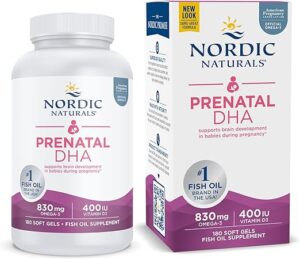
If you’re looking to up your intake of DHA during your pregnancy, this prenatal is a good supplement to take in addition to your daily prenatal vitamin. With 480 mg of DHA per serving, it surpasses daily intake recommendations of omega-3s for baby’s brain development. It’s also certified to be free of environmental toxins, including heavy metals, and has earned a seal of approval by NSF International (a third party that tests supplements for quality and safety).
Pros
- NSF-certified
- Organic
- Includes strawberry flavor option
Cons
- Lacks other vitamins
Naturelo Prenatal Multivitamins
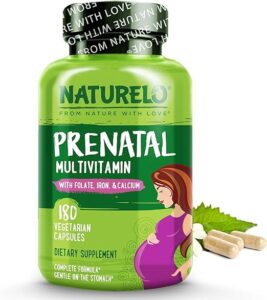
Naturelo Prenatal Multivitamin is a plant-based multivitamin that contains 25 nutrients to help you and your baby throughout pregnancy.
These supplements are easy to stomach and absorb, and they even include a moderate non-constipating type of iron to help make those nine months a little easier.
These excellent all-purpose supplements are non-GMO (made without genetic engineering), include no preservatives, colors, or flavoring, and are vegan-friendly. The only disadvantage is that the tablets are fairly large, so if you have difficulties swallowing them, you should look for anything different.
Pros
- Vegan
- Includes iron
Cons
- Large tablets
- Must be taken three times daily
- Pricey – 180 tablets last for just two months
Pink Stork Liquid Prenatal
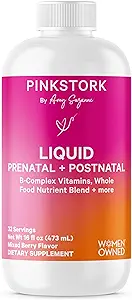
Liquid prenatal vitamins may be a good choice if you’re having a tough time swallowing pills and you’re not into gummies. (Though they do have a flavor, so keep that in mind.) The Pink Stork liquid contains 100% or more of the daily recommendation for many important nutrients. It’s gluten-free, non-GMO and contains no animal products. Plus, it claims its 18 mg of iron are non-constipating.
Pros
- Can mix with other beverages
- Women-owned company
Cons
- No DHA
- Not many servings in each bottle
Conclusion
In conclusion, choosing the best prenatal vitamin during pregnancy is an important decision for both you and your growing baby. With so many options available, it can be overwhelming to determine which one is the best for you. The best 10 prenatal vitamins mentioned in this article are all top-rated and have been trusted by many expecting mothers. However, it’s crucial to remember that every pregnancy and every woman is unique. It’s always best to consult with your healthcare provider before starting any new supplement, including prenatal vitamins. By working together with your doctor, you can find the right prenatal vitamin to support a healthy pregnancy and ensure a bright future for your growing family.
Related: How Much Folic Acid Do I Need To Have?




